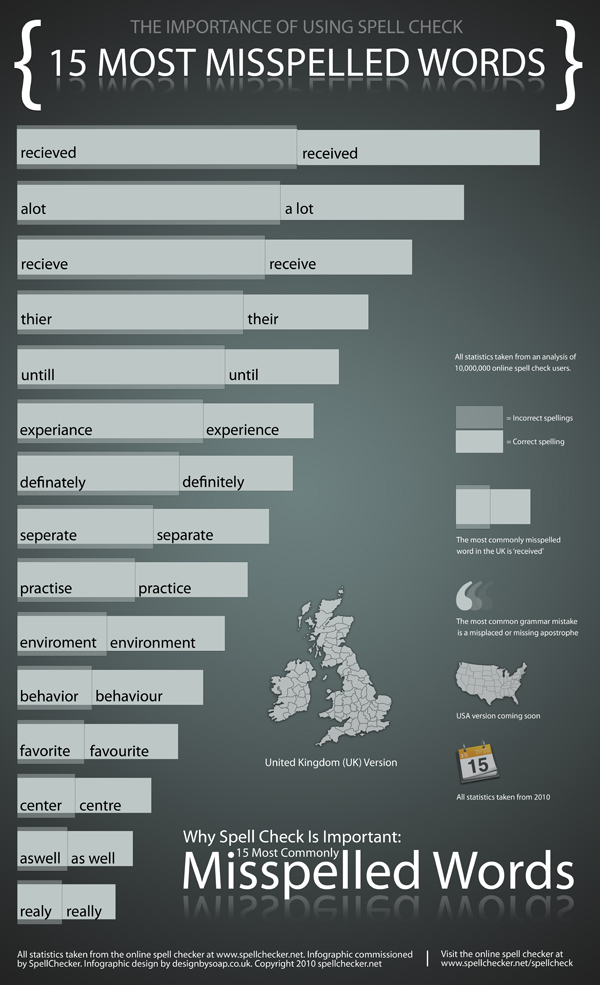Many of the commonly misspelled words plaguing America also annoy UK writers. In fact, 8 of the 15 most misspelled words in there are on the American list of misspelled words

You can download the full-size poster here.
An asterisk indicates words found on both lists.
15 Most Misspelled Words in UK English
*1: Received–the “I” and “E” are often switched.
*2: A lot–two words, not “alot”.
*3: Their–again, the dreaded “ie” to “ei” flip.
*4: Until–confused with “till”; only one “L”.
5: Experience–an “A” often creeps in.
*6: Definitely–sometimes an “A” replaces the second “I”.
*7: Separate–two “Es”, two “As”.
8: Practice–a rogue “S” may replace the second “C”.
9: Environment–remember the “N” in the middle.
*10: Behaviour–the “U” is often forgotten.
11: Favourite–again with the forgotten “U”.
12: Centre–“center” is incorrect in UK English.
13: As well–often written as one word.
*14: Really–two “Ls”.
15: Occurrance–two “Cs”, two “Rs”.
A Parting of the Ways
Half a century after America became independent, Noah Webster began to “Americanize” the language. Many words with a “C” soon sported an “S” (“defense”), and he removed an “L” from “traveler”. He also attempted to change “tongue” to “tung”, but this proved unpopular.
In 1906, the Simplified Spelling Board initiated further changes. Their plan to convert “-ed” to “-t” in words like “wished” did not catch on, but some silent letters were eliminated (“behavior”). They changed “-re” to “-er” (“fiber”, “center”), and they swapped many an “S” for a “Z” (“specialize”). Completely removed from the language were æ and œ, which is why America no longer has amœbas, leukæmia, or encyclopædias (or diarrhœa, for that matter).
Common Cultural Variations
Some very basic words in UK and American English vary in spelling, and the lines between them are usually solid. An example of rare borderline words is “grey/gray”. In UK English, “grey” has a single spelling; in American English, the accepted spelling is “gray”, yet the UK spelling occasionally slips in. Though it is technically wrong, some may turn a blind eye, but type “grey” into an American English spell checker, and the program will throw a flag faster than a football official.
Though many a silent U is gone from American English, UK English still employs it in many words, including colour, honour, and armour. People from the UK enjoy a fizzy drink from an aluminium tin and they fly in aeroplanes, while Americans drink soda out of aluminum can and fly in airplanes.








